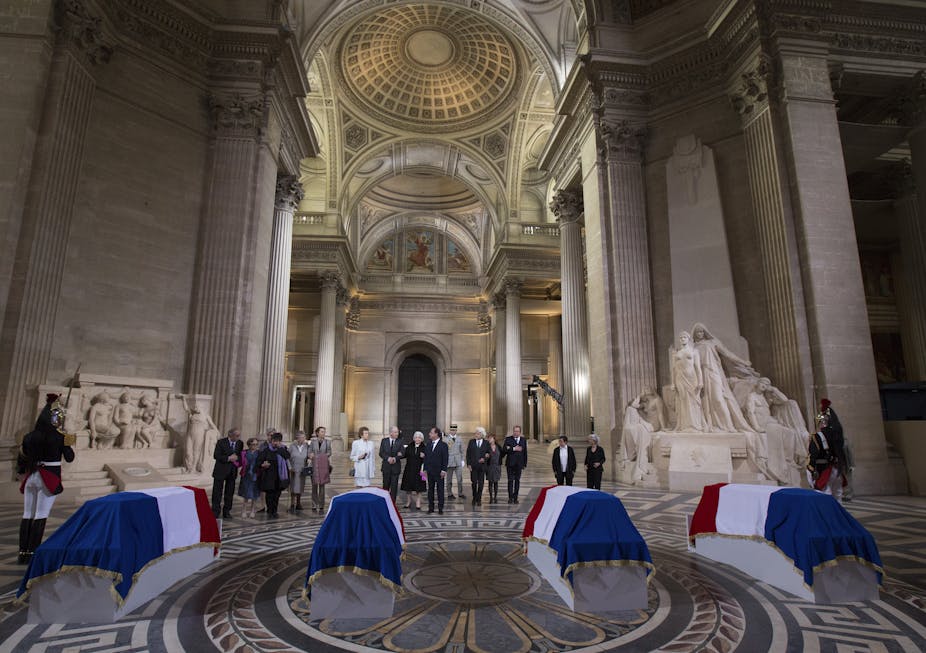Four prominent members of the French Resistance have been interred in the Panthéon in Paris, home to the heroes of the French Republic. President François Hollande selected these two men and two women himself in February 2014 for the honour of being laid to rest alongside French writers, politicians and leaders.
The date of the ceremony, May 27, was chosen to coincide with France’s day of memory for the Resistance to Nazi Occupation and the Vichy regime in World War II.
The ceremony was designed to demonstrate the importance of the Republic, and its traditions of liberty, equality and fraternity, with Hollande repeatedly stressing the need to stand up to oppression.
Coming just five months after the attack on a Jewish supermarket in the east of Paris in January in the wake of the Charlie Hebdo shootings, the interment of Jean Zay, the Jewish education minister in the inter-war Popular Front government and architect of the Cannes film festival, was particularly significant.
Joining Zay in the Panthéon are the mortal remains of Pierre Brossolette, former head of the intelligence wing of the Gaullist Resistance movement. There’s also soil taken from the graves of two women: Geneviève de Gaulle-Anthonioz, niece of Charles de Gaulle, and Germaine Tillion, one of the founding members of the first Resistance network in France – the Réseau du Musée de l’homme. Their interment takes the total number of women laid to rest in the Panthéon to just four.
Heroes all
These were undoubtedly remarkable individuals – and yet Hollande’s decision to honour them has not escaped controversy. Why, for example, choose Zay, but not one of the many other members of the pre-Vichy government who elected to flee to North Africa on board the steamship Massilia? Why de Gaulle-Anthonioz, whose uncle, the leader of Resistance and the founder of the current Fifth Republic, forbade any posthumous memorials or symbolism in his will?
Nevertheless, Hollande’s speech at Wednesday’s ceremony made a stark case for the celebration of these lives. Not only was Jean Zay a Jewish politician opposed to fascism; he was, Hollande said, a hero of the modern Republican principle of laïcité (secularism), placing his service to the state above his religious beliefs.
Likewise, Brossolette was singled out for his defence of freedom, while de Gaulle-Anthonioz and Tillion were praised for their attacks on poverty and on oppression across the world. Tillion’s defence of the rights of Algerian citizens during and after the Algerian War put her in opposition to the views of successive governments of the Fourth and Fifth Republics, yet on Wednesday her actions were hailed as a successful defence of the equality so dear to the Republic.
The same applies to de Gaulle-Anthonioz, whose experiences alongside Tillion in the Ravensbrück concentration camp led her to campaign for the rights of former internees to justice, notably testifying at the 1987 trial of Gestapo chief Klaus Barbie, the so-called “Butcher of Lyon”.
Ambivalence
When he chose these members of the Resistance for interment in February 2014, Hollande could not have anticipated the horrific events of January 2015, or how the interment of these remarkable citizens would resonate with them – but he clearly grasps their resonance now.
He duly used these remarkable Resistance stories to reflect on the importance of freedom, rights, and secularism in the modern-day Republic. His message to France and the rest of the world was that the lessons of the Occupation, when both the Vichy authorities and the Nazis discriminated against and murdered civilians on racial and religious grounds, must continue to be learnt.
And yet, many French people were uneasy about the politicisation of the interment. Indeed, the families of de Gaulle-Anthonioz and Tillion politely declined to allow the government to exhume the remains of the two women, hence the use of soil from their graves. That’s a measure of the deep ambivalence that greeted Hollande’s attempt to associate his presidency with the legacy of the Resistance.
It remains to be seen whether France will witness further anti-Semitic and religiously motivated terror attacks – and until it does, there’s no knowing whether this move to put the anti-racist Resistance back at the centre of French political culture will stick.

